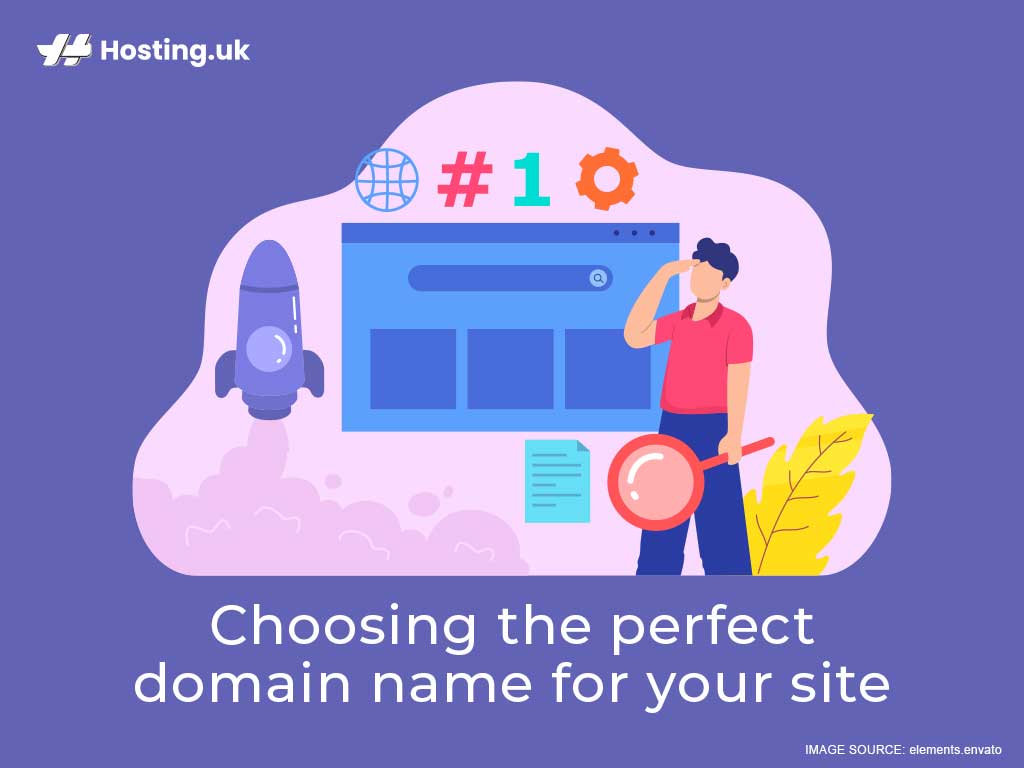A domain name is the first thing people see when they come to your site. Whether you are setting up a site for a business, organisation, or school, choosing an effective domain can be difficult. Even yet, the procedure does not have to be stressful. You can take simple steps to make sure you choose a name that will help your brand succeed on the web.
Table of Contents
What is a domain name?
Your website’s domain serves as its internet address. It comprises two parts, a TLD (Top-Level Domain) and a second-level domain. The TLD identifies the country or region where the website is registered. At the same time, the second-level domain generally includes words related to your company or business.
For example, https://hosting.co.uk/ is a domain name, and if you type that into your browser, it will direct you to the site’s homepage. The ‘hosting’ is the second-level domain, while ‘uk’ represents the TLD. Other examples of TLDs include a .com, .info, .biz etc.
When you first understand what is a domain name, it gets much easier to move forward in launching your website. This article will show you on how to decide on a great domain name for your new business and explain some pitfalls.
The distinction between a domain name and hosting

While a domain name gives our site an online identity or an address, hosting gives our site a place to call home. Think of it as an office where you’ve kept your files. And anytime someone wants to know more about your services or company, they go to that office. Check out more about this here.
How to choose a domain
Choosing a domain name for your website is an essential part of the beginning stages of your blog. When someone visits your site, the first thing to interact with will be your web address. It would help if you tried as much as possible to nail on this as you did on your branding and business plan. When they visit your site, the first impression people get can mean the difference between sticking around or just clicking away because it didn’t grab their attention.
1. Make it memorable
You would want to choose a domain name that is relatively easy for your site visitors to remember. In a world with over 1.4 billion websites, you might want to give your users an easy time when searching for your site. An easy-to-remember domain name can do you a lot good.
2. Choose your top-level domain extension with caution
As you know, the domain extension you use plays an essential role in improving your online visibility. The ‘.com’ extension is ideal for businesses, while the ‘.uk’ extension represents the United Kingdom. We also have ‘.org’, which organisations use.
3. SEO with Domain name
The ranking of a website determines where it will be displayed in the search engine result list. The higher the rank, the nearer the top of the list you are. Having a well-researched keyword in your industry as a domain name helps your site rank better whenever a customer queries online.
4. Privatising your domain details
When registering for a domain name, one has to provide contact details as the domain owner. However, anyone can access these details publicly via the WHOIS database. When such happens, you might fall victim to spammers, unauthorised domain transfer. Get a uk domain name hosting and details safe. Lots of UK domain names and hosting companies offer this service to their customers.
This will help guard your details from the public eye. Even when you decide to buy a ‘.com’ domain, you get an option of subscribing to domain protection to hide your data from the WHOIS database. Being informed about such ways of prevention, especially in this time and era, is an immeasurable thing.
Things to avoid
All said and done; a few practices can lead you to lose potential site visitors. You don’t want to turn away a customer before visiting your website.
1. Almost similar names
If you want to buy a domain name and a similar one is already in use, try as much as possible to search for another domain name to avoid similarities. Almost similar domain names may cause you to lose customers who would most likely choose the wrong address.
2. Adding double letters to domain names
You don’t want to add double letters to your domain name, for this will always bring back a typo and frustrate your users when they try to get to your site.
How to create a domain name
It’s good you take your time and understand what is a domain name, identify the best domain name to use for your website, and search for it as soon as you can. As you are looking for a domain, someone else is also looking for the same. You don’t want to risk someone else buying it.
How to register a domain name
It’s easier today to register a domain than to decide where to buy a domain name. But you don’t have to worry anymore. Within a few clicks, you will have your domain name ready. We have been in the industry for over a decade, offering affordable hosting services that keep speed, space, and customer service.
Buying a domain name
The first thing to know on how to buy a domain name is a clear idea of what you want to do with your website, what kind of site it will be, and who is likely to visit it. These questions are hard to answer in the beginning when you’re just starting, but they’re essential if you want to have a successful site later on. A lot of people start with buying a name before realising it doesn’t represent their primary goal.
Final thoughts
When choosing a domain name, it’s essential to remember that the shorter the domain is, the better. You want your visitors to remember your blog’s URL and share it easily with others. Get hold of all the best practices, get a deeper understanding of what is a domain name, how to buy a domain name, and how you can secure your domain name details. For trendy domains and full domain ID privacy get your domain and hosting on Hosting UK. If you want to transfer click here or learn more about domains go here.
